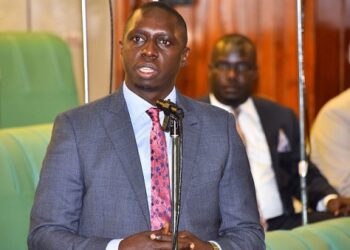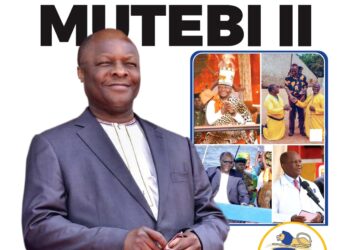Andrew M. Mwenda
President Robert Mugabe has been forced out power after 37 years as leader of Zimbabwe. His fall has been celebrated by large crowds of Zimbabweans but more so the British press who have used all sorts of adjectives to demonize him. He has been vilified as an ageing, corrupt despot that wrecked his country’s economy and wanted to hand power to his wife after ruling for too long. But how long is too long?
In 509 BCE the Romans revolted and deposed King Tarquinius Superbus (Tarquinius The Proud) and established a republic under a supreme Senate, which would elect two consuls as chief executives to serve a nonrenewable term of one year. This system survived for 482 years until Octavian (August Caesar) transformed the republic into an empire, circa 27BC. Under this system of a short-lived chief executive, Rome grew from a small kingdom in Italy to control an empire covering most of Europe, North Africa all the way to Asia Minor.
From their perspective, the Romans would find the US presidency that can last eight years too long. The lesson here is that there is no universal standard on longevity in power by presidents. The view that Mugabe ruled for too long is based on a standard set by Europeans. We African elites have embraced it without critical examination. May be Zimbabwe’s context requires a president to serve a nonrenewable term of one year or a term of ten years renewable thrice. Could the problem of Africa be that no one cares to think outside the box set for us by others?
Secondly, we had been told that Mugabe had personalized power. Yet his quick and easy falls shows his power was derived from his ability to arbitrate different powerful interests over which he superintended. When he was seen to represent the interests of his wife and her allies (who were not original to ZANU-PF) these interests decided to remove him. Therefore all the books, academic papers and media reports on personal rule by Mugabe were misrepresenting Zimbabwe’s politics. Thus the concept of “personalization of power” (of which I have been a culprit) that we have internalized uncritically obscures rather than illuminates our understanding of the reality of politics in Africa.
Mugabe has also been accused of wrecking the economy of Zimbabwe by expropriating the property of white farmers. He has always defended himself saying that it is not his land reforms that led to economic collapse but the imposition of sanctions on Zimbabwe by Western powers. For many years, I refused to listen to him. Like most African elites, I embraced accusations against him uncritically. But do such confiscations automatically destroy an economy?
When Yoweri Museveni captured power in Uganda, Western ideologues made this claim. They convinced him to return Asian properties that had been confiscated by Idi Amin in 1972 arguing that only such a gesture can make Uganda attractive to foreign investors. He did. Uganda’s economy rebounded and the nation entered a long-term trajectory of growth. In most economic literature on post 1986 Uganda, this return of Asian properties is presented a major reason for our growth. Therefore it seems obvious that respect for private property does the magic of economic growth, right?
The reality is more complex. As Museveni was returning Asian properties to their former owners, he was also grabbing land from Ugandan ranchers and handing it over to landless cattle keepers in Ankole and parts of Buganda – exactly as Mugabe was later to do with white farmers. Western governments, academia and media said nothing. Why? The victims of Museveni’s land reforms were not white or Ugandan-Asians with Australian, British and Canadian citizenship. They were native Ugandans. Yet in spite of these confiscations, Uganda’s economy grew rapidly.
Also in 1946, South Korea supported by the American Military Government confiscated all the property of the Japanese who had been its colonial masters – land, banks, factories, etc. – which constituted about 75% of that nation’s GDP. Yet in spite of these confiscations, South Korea transformed from a poor agricultural society into a rich industrial nation within a generation.
These facts show that confiscations of property per say do not necessarily destroy an economy. That is why Africa needs to find her own voice to tell her story. We are always regurgitating ideas sold to us as universal truths by others. Yet a lot of these ideas are ideological positions that serve the interests of other people – often at our expense. All too often, these high sounding ideals are weapons used by Western powers to pursue their agendas.
It seems the Mugabe Zimbabweans (and all of us) know or think we know is not the Mugabe that exists. Rather it is a Mugabe that has been carefully constructed for our consumption by Western governments using their media and academia to serve their interests. The people of Zimbabwe celebrating Mugabe’s fall are not dancing to their own tune but one written in London. The British government and press parading as their allies were actually more responsible for their misery than Mugabe. This is not to say Mugabe ruled like a saint. Nowhere is propaganda more effective (and dangerous) than when it uses (and abuses) actual truths.
Zimbabweans may have suffered many economic and political indignities under Mugabe. But most of it because in his attempt to hand the economy back to his people, Mugabe unleashed the wrath of the global powers whose racial cousins were victims of his policies. They imposed sanctions leading to economic collapse and then used their powerful instruments of mass propaganda – mass media, books, etc. to vilify him and blame the economic crisis on him.
It happened differently in South Africa. Nelson Mandela was induced to surrender the interests of his people to these forces of global capitalism. He helped them to preserve white economic superiority and the economic marginalization of black people. Post-apartheid “democratic” South Africa has entrenched the dominance of white capital, which had previously been backed by apartheid. Mandela did not end apartheid but helped renew it under black superintendents. In exchange, Western media and academia lionized and sanctified him.
Look at his: in 1994, white capital controlled 78% of total capital in South Africa. In 2017, white capital controls 93% of total capital. Yet across Africa, even in South Africa, everyone sings praises of Mandela and curses Mugabe. This is largely because we learn our heroes and villains through other people’s media. The message from the forces of global capitalism is clear: serve our interests – even at the expense of your people – and you shall be made a saint. Defend your people’s interests against ours and you shall be vilified.
So we must ask: are the wars we fight over democracy, human rights, term limits, etc. really our wars? Democracy seems more susceptible to infiltration and sabotage than authoritarianism. It makes it harder for a poor country to defend her national interests if they conflict with those of global capitalism. The West can fund NGOs, mass media and opposition parties against an incumbent in a poor country who defends the interests of his people against these forces. If they argue for democracy in poor countries, the motivation could be to control rather than to improve governance. Do we ever see these things? I wonder.
Do you have a story in your community or an opinion to share with us: Email us at editorial@watchdoguganda.com












